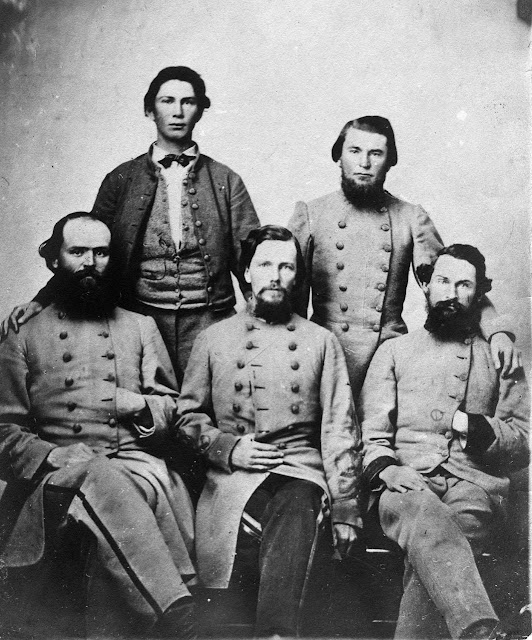It's Memorial Day again.
So recently I have heard that there are some Americans who are offended by the depiction of Memorial Day photos and artwork that include Confederate soldiers.
What is Memorial Day?
As we can see, the original intent of the holiday was to "commemorate the Union and Confederate soldiers who died in the Civil War." So, there should be no disagreement on the honoring of our fallen Confederate soldiers.
Memorial Day is a United States federal holiday which occurs every year on the final Monday of May. Memorial Day is a day of remembering the men and women who died while serving in the United States Armed Forces. Formerly known as Decoration Day, it originated after the American Civil War to commemorate the Union and Confederate soldiers who died in the Civil War. By the 20th century, Memorial Day had been extended to honor all Americans who have died while in the military service. It typically marks the start of the summer vacation season, while Labor Day marks its end. (Source: Wikipedia; additional background information at Memorial Day History)
But why would some feel it inappropriate to honor them in the first place?
It all depends on how they view history. Some say Confederates fought just to keep slaves (despite the fact that four Union states fighting the South during the war also owned slaves); and others would say that they were fighting for their freedoms (State's rights).
Declaring independence from the Federal government (which they felt was destroying the original intent of the Constitution) was less of a radical thought or action than when we declared independence from Great Britain.
Governments are instituted among Men, deriving their just powers from the consent of the governed, That whenever any Form of Government becomes destructive of these ends, it is the Right of the People to alter or to abolish it, and to institute new Government. (Declaration of Independence)
Even the term "Civil War" is an incorrect labeling of that war. The South was not attempting to overthrow or destroy the Federal government. In fact, they simply asked to be left alone as they saw themselves as independent State governments. Then they formed the Confederate States of America. Thus, this war was a conflict between two governments, which means it wasn't a group of citizens attempting to over through and institute a new government. The North were the ones who called for 75,000 troops to force them back into the Union.
There were only two pieces of property in Southern lands that Federal troops retained control of and refused to turn back over to the State after the South seceded. Ft. Sumter being one and Ft. Pickens at Pensacola being the other. South Carolina even offered them financial compensation to leave Sumter, but General Anderson refused to leave the fort. With Lincoln's vow to collect "duties and imposts"-the high tariffs-imposed on American citizens, which had more than doubled tariff duties, and his unrelenting push to force the Union back together, South Carolina fired on the Federal occupied fort.
The reaction to the firing on Ft. Sumter in Northern states was much like reaction seen in America after the attack on 9/11. Most Northern men in 1861 joined the ranks for "patriotic" reasons, "They attacked us." Only about two percent of the North were actual abolitionists, who wanted to see the slaves freed. (However, the topic of slavery and methods for a peaceable abolition is a discussion for another time.)
Then the North invaded the South and many young (and old) Confederates defended their homes, their families, and their freedoms.
Epic political and economic reasons aside, Southerners fought men who came into their lands.
Sadly, we were fighting each other, but those Southerners were Americans; Americans who believed that they were still fighting for the same reasons their fore fathers fought the British (taxes and a forced way of life).
So in the end, I honestly do not see anything wrong with remembering American-born soldiers who fought for their freedom.












